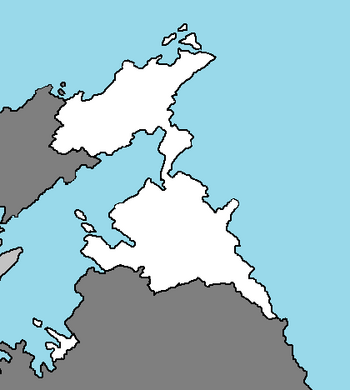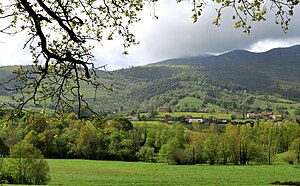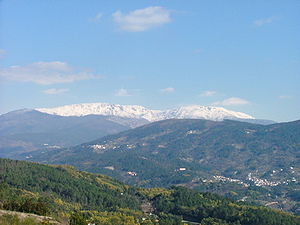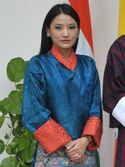Alecburgh
The Matriarchy of Alecburgh Aelekburge | |
|---|---|
|
Flag | |
| Motto: "United we Stand, as Brothers we Prosper." | |
| Anthem: "Help Us Through the Night." | |
 Map of Alecburgh | |
| Capital | Kynnport, Federal District of Kynnport |
| Largest city | Draycott, Marlinia |
| Official languages | English, Esperanto, Varzic |
| Recognised national languages | Spanish |
| Recognised regional languages | Old Brennish, Airolian, Costolo, and Hendreyan |
| Ethnic groups | Loganians, Oloanese, Costa de Soliens, Southern Croix, Caroginians, Karthagers, and Morenians |
| Demonym(s) | Alecburghish, Alecburghian |
| Government | Constitutional Monarchy |
• Queen | Queen Iris |
| Pacifica Champlain-Kourtney | |
| Legislature | The Parliament of Alecburgh |
| The House of Saint Katerina | |
| The House of Saint Bethany | |
| Unification of Logani-Oloan and South Croix | |
• Unification Day | September 17th, 1960 |
| Population | |
• 2021 estimate | 87,019,237 |
| GDP (nominal) | 2021 estimate |
• Total | 566.032 billion |
• Per capita | 6,503 |
| Currency | Pound |
| Time zone | UTC-5, -6, and -7 (WAT, CAT, and EAT (Western, Central, and Eastern Alecburghish Time)) |
| Date format | mm-dd-yyyy |
| Driving side | right side of the Road, except for the island of Rhynok in Varzo. |
| Calling code | +204 |
| Internet TLD | .ac |
The Federacy of Alecburgh, also referred to as the Matriarchy of Alecburgh, is a nation located on the continent of Adula, bordered to the northwest by Saint Croix and Bens, to the south by Cyruda and Vorrica, and to the east by the Toyana Ocean, with maritime borders with Bazira and Nebetia by way of the Croix Sea. It is one of the most densely populated nations on Iearth, with over 87 million people in a generally tightly geographically confined area. Much of the nation is consisting of mountains and highlands, with much of the area's low-lying area being heavily developed by human civilization. In particular, major cities like the capital of Kynnport and Draycott are heavily urbanized and compacted areas, as well as some of the largest cities in Adula and the world.
Alecburgh's history spans back tens of thousands of years with early human settlement. In the 900s, it became prominent as a trading colony for the Emmirian Empire, as well as the subsequent Quetanan and Skithan Empires, all of which helped develop the region into an economic hub for maritime trade. However, following the collapse of major imperial powers at the conclusion of the Barretoan Wars, Alecburgh's political stability became fractured as the country split into many areas of control with the two most prominent factions being the kingdoms of Oloan and South Croix. In 1960, the nation was united following the Second Oloanese-Southern Croix War, and the nation was established under a monarchy. Despite unification, the country experienced occasions of unrest and revolution, particularly seen evidenced by the recent Alecburghish-Cambrian War. The country's current Prime Minister is Pacifica Champlain-Kourtney, who was elected after the resignation of Sparrow Creed, who in turn was elected following an emergency referendum in 2021 to replace Benjamin Warren. The country's current monarch is Iris I.
Alecburgh is a developed nation with high standards of living despite recent social turmoil, and is considered a high-income economy. It has an annual GDP of 566.03 billion, making it the 23rd-largest economy, though contrasted with its high population means there is significant economic inequality with a per capita GDP of around 6,503. However, the country has made significant advancements in science, healthcare, technology, and social development. It is a member of multiple international organizations like the Coalition of Crown Albatross, the Southeastern International Association of Adula, and the Coalition Trade Organization.
History
Prehistory

Alecburgh's prehistory begins in an oscillation, a warm period around 12,000 BC, with Late Palaeolithic deer-hunting camps of the Kynni culture at the edge of the ice in what is now the country's southernmost state. This period was characterized by small bands of hunter-gatherer-fishers using flint technology.
Alecburgh in historic form was first described as a territory around 23 AD in a script written by a scribe naming a tribal king Alcberg in a dialect of Croisa, an ancient language spoken around the Croix Sea. Which king specifically being referred to is unknown, but regional mythology presents a long line of legendary and semi-legendary kings going back to the last centuries BC. As for literacy in Alecburgh itself, the runic script was in use among the south Croix elite by at least the 2nd century AD.
Middle Ages
In the 8th century, Alecburgh started benefiting from its commercially strategic position on the Toyana Ocean and the Emmiria Sea, and went on to become a center of trading. It became part of the Emmirian Empire in 830, at which point Islam spread to the region. Islam never took a major hold in Alecburgh like it did in other locations around the empire, and Christian groups retained their presence even as the empire dissipated from Alecburgh in the late 900s.
Contemporary
Modern Era
In 1958, King Jackson III of Oloan ordered an attack against South Croix, and after multiple attacks against the border between the two nations, Empress Lily reluctantly had to declare war, which led to the Gulf of Croix War. In 1960, at the conclusion of the conflict, the nation was united under the rule of Oloan, and the Federation of Alecburgh was established with a matriarchal monarchy.
In 1979, Alecburgh joined the Coalition of Crown Albatross.
2021 crisis and Cambrian War
On January 22nd, 2021, following a tense military buildup of Alecburgian forces on the border of Saint Croix and Bens and hostile diplomatic interactions at the 2021 Tregueux Leaders Summit, Queen Diana I removed Prime Minister Benjamin Warren from power and instituted absolute rule. Months of protests and international scrutiny followed, with many nations within the Coalition of Crown Albatross condemning Diana for her actions. Amidst the protests, the state of Mandalay declared independence, and protesters and federal forces clashed, leading to multiple deaths. Member states in the SEIAA also condemned the developing crisis, and ultimately on March 10th, Queen Diana revoked her absolute rule and instituted national elections for a new government. Despite this, protests and independence movements in several parts of the nation continued.
Cambrian War
On April 4th, 2021, Sparrow Creed was elected Prime Minister to much generous reception from a majority of the Alecburghian public and the international community. However, a secessionist movement that gained prominence during the protests against Queen Diana within the state of Luciano, known as the Republic of Cambria, emerged to declare independence. Its de-facto leader, Jacque Boudreaux, declared that the entirety of the state was under Cambrian sovereignty, to which the Alecburghian government responded by denying their secession. In reaction to the government's refusal, multiple insurgents aligned with Cambria conducted violent attacks against civilian targets, specifically on April 21st in the Aires train bombing which killed 23 people, and the April 27th Mandalay bus massacre which resulted in the deaths of over 60 people, mainly international tourists.
On May 6th, Prime Minister Creed stated that an agreement had been reached in which the Cambrian Republic would be granted autonomy within their declared state in Luciano. Effectively, Cambria was a sovereign nation with the stipulation that they would not be hostile to the Alecburghian people or government, to which Boudreaux and his representatives accepted. The crisis largely subsided for the following month, with the exception of a lone-wolf bombing in Dawea, neighboring Cyruda, in response to their government's deployment of 2,000 troops in support of Alecburgh. Nevertheless, violence within Alecburgh became rare and infrequent until June 8th when Boudreaux unexpectedly demanded the annexation of another state with secessionist leanings; Mandalay. The government refused, and terror attacks once again escalated. A mass stabbing at Saint Aliester Church in Venice resulted in five people being killed and sparked international condemnation, with the governments of Zamastan, Emmiria, Elbresia, and Siniapore for the first time endorsing the Alecburghian government.
On November 14, Alecburgh and the separatist-state of Cambria would sign a peace treaty that would end the war. As part of it, Sparrow Creed resigned from her post as Prime Minister of Alecburgh.
Geography
Alecburgh is located on the continent of Adula, bordered to the northwest by Saint Croix and Bens, to the south by Cyruda and Vorrica, and to the east by the Toyana Ocean, with maritime borders with Bazira and Nebetia by way of the Croix Sea.
The country is heavily densified by mountains, most of which are slopped and smoothed over due to millions of years of erosion, but with some exceptions in jagged nature preserved in natural parks. Regal Peak is the highest mountain in Alecburgh, as well as the fourth-highest in Southern Adula, standing at 2,351 m (7,713 ft). It is one of the few areas in Alecburgh with snow year round, making it an important seasonal attraction for skiers and winter sports enthusiasts.
Some islands in the Croix Sea occupied by Alecburgh are volcanic, though most are dormant. Geologists cite at least two active volcanos in Alecburgh, both of which are islands in the Croix Sea; Mount Iadu and Mount Gilhare. The last terrestrial volcanic eruption occurred in 1957–58 (Gilhare) and minor earthquakes occur sporadically, usually of low intensity. However, due to Alecburgh's proximity to other major fault lines, specifically those in neighboring countries like Qolaysia and Saint Croix and Bens, major earthquakes with epicenters far from Alecburgh can still be felt with exceptional degrees of magnitude, as is the case with the 2021 Temebok earthquake.
Climate
The Alecburghian climate is classified by dry summers and mild, wet winters. Warm prevailing temperatures on the Toyana Ocean, as well as a dry air permeated on the Croix Sea, means that temperatures rarely dip below freezing in areas that are not at high altitude. At the highest altitudes of the country, however, particularly in the southern interior, snow can be found year-round in mountainous areas. Annual average rainfall in the mainland varies from just over 3,200 mm (126.0 in) in coastal areas along the Toyana Ocean to less than 500 mm (19.7 in) in southern parts of the country along the border with Cyruda.
In some areas, annual diurnal average temperatures can be as high as 26 °C (79 °F), and summer's highest temperatures are routinely over 40 °C (104 °F). The record high of 47.4 °C (117.3 °F) was recorded on the border with Saint Croix and Bens, although this might not be the hottest spot in summer, according to satellite readings.
Due to seasonal monsoons, Alecburgh can experience hurricanes. Storms rarely reach major classification, although there are recorded instances of cyclones that have produced damage.
Biodiversity
Alecburgh is located on the South Adula Basin, the third-most biodiverse area in the world. Due to its geographical and climatic context - between the Croix Sea and the Toyana Ocean - Alecburgh has a high rate of biodiversity on land and at sea. It is home to six terrestrial ecoregions: Lowland temperate mixed forests, Midland mixed forests, Highland evergreen forests, Kylani sclerophyllous and semi-deciduous forests, Northwest Croix montane forests, and Southwest Croix sclerophyllous and mixed forests.
Eucalyptus, cork oak and maritime pine together make up 71% of the total forested area of continental Alecburgh, followed by the holm oak, the stone pine, the other oak trees (Q. robur, Q. faginea and Q. pyrenaica) and the sweet chestnut, respectively. Deforestation by centuries of rampant human development is extensive, and Alecburgh suffers from desertification in some areas contributed to intensive irrigation, climate change, and runoff. However, preservation of forests has been implemented at federal levels, and some natural preservation sites have seen a rebound in tree population. These geographical and climatic conditions facilitate the introduction of exotic species that later turn to be invasive and destructive to the native habitats. More than 20% of the total number of extant species in Alecburgh are exotic.
Alecburgh has a whole is an important stopover for migratory bird species, the marshes of the Croix lowland coast hosting various aquatic bird species, the Croix eagle and Bens vulture, the black stork and griffon vulture, seabird sanctuaries of the Croix Island territories all represent the great diversity of wild avian species (around 450 in Alecburgh), not only migratory but also endemic (e.g. trocaz pigeon, Carthara bullfinch) or exotic (crested myna, pin-tailed whydah).
The large mammalian species of Alecburgh (the fallow deer, red deer, roe deer, Adula ibex, wild boar, red fox, Adula wolf and Adula lynx) were once widespread throughout the country, but intense hunting, habitat degradation and growing pressure from agriculture and livestock reduced population numbers on a large scale in the 19th and early 20th century, others, such as the Alecburghian ibex were even led to extinction. Today, these animals are re-expanding their native range. Smaller mammals include the red squirrel, Adulan badger, Adulan otter, Adulan mongoose, Alecburgh hare, Adula rabbit, common genet, Saint Croix wildcat, among others.
The Alecburgh east coast on the Toyana Ocean is part of the major Boundary Upwelling Systems of the ocean. This seasonal upwelling system typically seen during the summer months brings cooler, nutrient rich water up to the sea surface promoting phytoplankton growth, zooplankton development and the subsequent rich diversity in pelagic fish and other marine invertebrates. This, adding to its large EEZ makes Alecburgh one of the largest fish consumers in the world per capita. Sardines and horse mackerel are collected in the thousands every year, while blue whiting, monkfish, Toyana cod, cephalopods, skates or any other form of seafood are traditionally fished in the local coastal villages. This upwelling also allows Alecburgh to have kelp forests which are otherwise very uncommon or non-existent on the Toyana coasts.
73% of the freshwater fish occurring in the South Adulan subcontinent are endemic, the largest out of any region in Adula. Many of these endemic species are concentrated in bodies of water of the central western region (one exclusively endemic), these and other bodies of water throughout the subcontinent are mostly temporary and prone to drought every year, placing most of these species under Threatened status.
Politics and Government
Alecburgh is a constitutional monarchy with hereditary monarch and a bicameral parliament, led by Queen Iris I and the current Prime Minister, Pacifica Champlain-Kourtney, who succeeded Sparrow Creed in December of 2021. The legislative branch is made up of the House of Saint Bethany, a lower house with 350 members, elected by popular vote on block lists by proportional representation to serve four-year terms, and the House of Saint Katerina, an upper house with 259 seats of which 208 are directly elected by popular vote, using a limited voting method, and the other 51 appointed by the regional legislatures to also serve four-year terms.
The executive branch consists of a Council of Ministers presided over by the Prime Minister, who is nominated as candidate by the monarch after holding consultations with representatives from the different parliamentary groups, voted in by the members of the lower house during an investiture session and then formally appointed by the monarch. In the 2021 emergency referendum, however, the constitution was changed to allow for individual candidates to sort their own campaigns.
Military
Alecburgh Army
Alecburgh Navy
Alecburgh Air Force
The armed forces have three branches: Navy, Army and Air Force. They serve primarily as a self-defense force whose mission is to protect the territorial integrity of the country and provide humanitarian assistance and security at home and abroad. There are roughly 200,000 enlisted personnel within the armed forces, with the ability for reservists to be called for duty.
Foreign Relations
Alecburgh is a member of many international organizations, most prominently being the Coalition of Crown Albatross, Coalition Trade Organization, and the Southeastern International Association of Adula. It has embassies and diplomatic consulates in 57 nations, and hosts more than 50 embassies in the capital of Kynnport.
Alecburgh's closest diplomatic allies are the members of the SEIAA, with Cyruda, Togaria, and the Mist Carthara Islands being the most prominent. Alecburgh is also close allies with Yuan, which has invested heavily in Alecburghian economic development and contributes much of the country's military aid. Elsewhere, international allies include Jerku, Barangadesh, Artegana, and Serra Leon. Alecburgh often finds itself on the critical end of major global powers like Zamastan and the WEDA states, although they have grown closer in diplomatic and economic ties in recent years.
Alecburgh's most prominent adversaries on the global front include Drambenburg, which largely comes with its influence investing in other nations in Southern Adula like Zalluabed, Qolaysia, and Buckingla. Saint Croix and Bens, while not a hostile adversary, is a historic opponent of Alecburghian foreign and domestic policy.
Human Rights

The Constitution of Alecburgh "protects all Alecburghish and all the peoples of Alecburgh in the exercise of human rights, their cultures and traditions, languages and institutions".
According to the CCA Human Rights Council, government investigations of alleged police abuses are often lengthy and punishments were light. Violence against outspoken critics of the government was cited as "a major problem". During the 2021 anti-monarchy protests, police and government forces used lethal force on demonstrators, resulting in at least 56 people being killed. Reforms were later made by Prime Minister Creed's government to address expression of free speech and policing, as well as loosening what constitutes public demonstration, although at the outbreak of the Alecburghish-Cambrian War, the government continued to heavily moderate expression.
Economy
Primary Sector
Agriculture in Alecburgh is based on small to medium-sized family-owned dispersed units. However, the sector also includes larger scale intensive farming export-oriented agrobusinesses backed by companies. The country produces a wide variety of crops and livestock products, including: tomatoes, citrus, green vegetables, rice, wheat, barley, maize, olives, oilseeds, nuts, cherries, bilberry, table grapes, edible mushrooms, dairy products, poultry and beef. Alecburgh is a top producer of cork and carob in the world, accounting to about 50% and 30% of world production respectively. It is also a major exporter of chestnut and a large producer of pulp.
Forestry has also played an important economic role among the rural communities and industry. In 2001, the gross agricultural product accounted for 4% of the national GDP.
Traditionally a sea power, Alecburgh has had a strong tradition in the Alecburghish fishing sector and is one of the countries with the highest fish consumption per capita. Alecburgh-processed fish products are exported through several companies, under a number of different brands and registered trademarks.
Alecburgh is a significant minerals producer and is ranked among Adula's leading copper producers. The nation is also a notable producer of tin, tungsten and silver. However, the country lacks the potential to conduct hydrocarbon exploration and aluminium, a limitation that has hindered the development of Alecburgh's mining and metallurgy sectors. Although the country has extensive iron and coal reserves – mainly in the north - low competitiveness forced a decrease in the extraction activity for these minerals.
Secondary Sector
Industry is diversified, ranging from automotive and bicycles, aerospace, electronics and textiles, to food, chemicals, cement and wood pulp. Modern non-traditional technology-based industries, such as aerospace, biotechnology and information technology, have been developed in several locations across the country.
Tertiary Sector
The banking and insurance sectors perform well in Alecburgh.
Travel and tourism continue to be extremely important for Alecburgh. It has been necessary for the country to focus upon its niche attractions, such as health, nature and rural tourism, to stay ahead of its competitors.
Energy
Infrastructure
Transport
Demographics
Education
Religion
Culture
Music and Art
Cuisine
Sports
Alecburgh is known for its proud sports traditions, and have multiple professional sports leagues and a college sporting league as well.
The Premier Football League is the top-tier of Alecburgh's football system. The competition is part of a promotion-relegation system that also includes the Football League of Alecburgh (FLA) which is the second tier, the Lower Alecburgh Systemic League (LASL) which is the third tier, and once a club is relegated from the LASL, they become an amateaur club and competes in over eight different leagues.
Alecburgh's second most popular sport is baseball, which the Sovereign Baseball League (SBL), formed in 1937, stands at the top of the hierarchy. The league does not run as a promotion-relegation system, and rather has 22 teams that stay in the league. In 1984, the Royal League of Baseball (RBL) was the SBL's attempt at making a promotion-relegation system, having the worst two teams drop down at the end of the season and the two best rise up. The RBL would be dissolved in
In 1953, a group of six Alecburghish universities came together to form the nation's first college sporting organization known as the SEAA (Secondary-Education Athletics Association). The SEAA would soon expand to thirty universities across Alecburgh, but once the Universidad Rodrígueza - Nuevo Sánchez of Isla de Rodríguez applied to join, the original six founding members planned a vote for the SEAA to be restructured. In 1977, the SEAA was disbanded in exchange for the forming of the Sovereign Collegiate Athletic Organization (SCAO). The SCAO is now comprised of 131 member schools on Mainland Alecburgh, Isla de Rodríguez, the Republic of Cambria, and also has _________ members in __________.

















